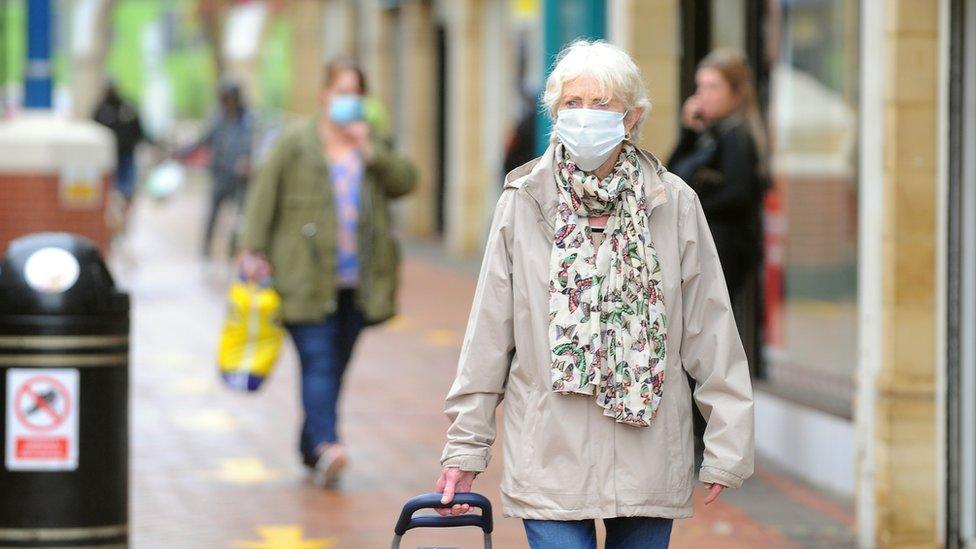Coronavirus: Tackling testing delays 'number one' priority, says minister
- Published
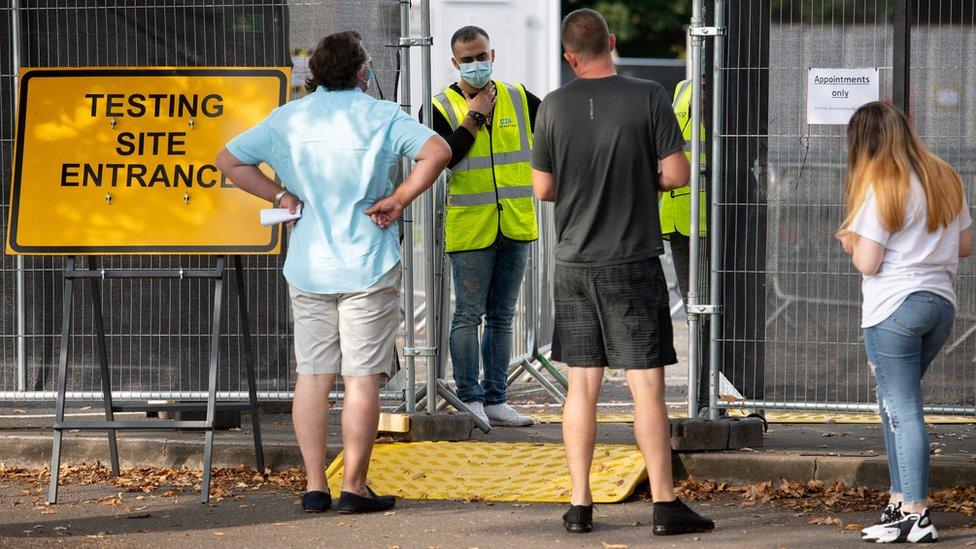
Plans to put the NHS top of the list for coronavirus tests will be published in the coming days, the justice secretary has said.
People in care homes would also be a priority, while schools could be considered, Robert Buckland said.
Resolving delays with testing was "the number one issue", he added.
Education Secretary Gavin Williamson said each school was given 10 home-testing kits at the start of term and could now order more from today.
At Prime Minister's Questions on Wednesday, Labour's deputy leader Angela Rayner said the prime minister had "time and again" made pledges on testing but "then breaks those promises".
Standing in for party leader Sir Keir Starmer at PMQs, she told the House of Commons: "They've had six months to get this right and yet the prime minister still can't deliver on his promises.
"The health secretary said yesterday it would take weeks to sort this situation out. We don't have weeks."
Mr Johnson defended the government's record, saying the UK had "done more tests than any other European country".
He said it was trying to meet a "colossal spike" in demand at "record speed", adding that 89% of tests done in person were being returned the next day.
Speaking earlier to BBC Breakfast, Mr Buckland said testing centres would be increasing from about 400 to 500 in the next few weeks.
As well as prioritising tests for the NHS and then social care, he said schools were also important because of their "knock-on effect to the working lives of parents and carers".
Health Secretary Matt Hancock will announce who will be prioritised for tests in the next few days.
Why are there delays?
A surge in demand for coronavirus tests has led to local shortages, with many people reporting problems securing online bookings and being directed to test sites hundreds of miles from home.
The large Lighthouse laboratories, run by the government to analyse test swabs from all the UK nations, have been under strain to process them all.
Test slots are limited because, while there seem to be enough testing sites, there are bottlenecks in labs for processing swabs, BBC health editor Hugh Pym said.
A new lab is due to be up and running but that could be a few weeks away - and until then ministers say current problems are likely to continue.
Bolton NHS Trust in Greater Manchester said that more than 100 people had turned up to accident and emergency on Tuesday asking for a test.
Matt Hancock: "We're working around the clock to make sure everyone who needs a test can get a test"
Mr Hancock, speaking in the House of Commons on Tuesday, said rising demand for tests meant the government was "having to prioritise once again and I do not shirk from decisions about prioritisation".
Data on backlogs in labs is not publicly available, but Mr Hancock said it was "less than a day's capacity". That means it could be anywhere up to 244,000.
The Department of Health has said about a quarter of people requesting tests have no need to do so - and only those with relevant symptoms should book.
What problems are schools facing?
Some closed for a period days after reopening while others have told classes and whole year groups - many of which form one bubble - to self-isolate for two weeks following confirmed cases.
Teaching unions have called for the education sector to be prioritised for the allocation of tests to ensure schools remain open.
Geoff Barton, general secretary of the Association of School and College Leaders (ASCL), said if issues with testing capacity were not fixed keeping schools open would become "unsustainable".
He told BBC Radio 4's Today programme head teachers would have to decide whether a bubble stays at home if a pupil or teacher showed Covid-19 symptoms and could not get a test to prove they were negative.
It would feel like lockdown "by default", he said, and be more frustrating for parents as it is unpredictable.
The ASCL, along with two other unions representing head teachers and governors - NAHT and the National Governance Association - has written to the PM expressing concern over the delays, saying school leaders are in an "impossible situation".
Education Secretary Gavin Williamson told MPs on Wednesday he had emphasised the importance of prioritising schools to Baroness Harding, head of the UK testing system.
He said they had this morning opened a schools ordering system to access tests directly from the NHS.
The people struggling to get a test

Cafe owners Scott Vining and his wife worry testing delays mean they will have to close their family business
Scott Vining's daughter fell ill with a temperature on Saturday. By Sunday, the rest of the family, who live near Dunstable, in Bedfordshire, had also developed symptoms.
"We've tried hundreds of times," he told the BBC about trying to book a test. "We started to try and book tests for my daughter on Sunday, to no avail, and then we started at 08:00 on Monday morning for us all."
At one point Scott was offered a test in Warwickshire, 65 miles away from his home, through the government website. But by the time he'd entered the details of his family of four, the spaces had disappeared.
The BBC spoke to people trying to get tests at a centre in Oldham
Maria Aziz, from west London, has been trying to book a test since Sunday, when her nine-year-old daughter, Mishal, complained of a sore throat. By 04:00 Monday, her daughter had developed a fever.
She said she had spent three days trying and failing to book a test. Her eldest daughter, Eimann, 14, also had to be withdrawn from school while she tried to book a test for her younger daughter.
"I'm trying through the government website and then yesterday there was also a number on the website to call - 119 - so I tried that as well. Each time there were no tests available. No home kits. No walk-in slots. No drive-through slots. Nothing."

YOUR QUESTIONS: We answer your queries
THE R NUMBER: What it means and why it matters
LOCAL LOCKDOWNS: What happens if you have one?
TEST AND TRACE: How does it work?
FURLOUGH: What happens when the scheme ends?

How many tests are being carried out?
Around 220,000 tests are processed each day, according to government figures for Monday.
The government said its UK laboratory daily testing capacity was more than 370,000 as of last week - which includes antibody tests and those tests used by scientists to estimate how widespread the virus is.
Testing capacity (excluding antibody tests and virus spread testing) is about 245,000 a day.
Government data shows that both testing capacity and laboratory capacity have increased considerably since the beginning of the pandemic, The aim is to increase capacity to 500,000 a day by the end of October.
However, there has been a sizeable gap between how many tests labs are able to process ("capacity") and the number of tests actually processed.
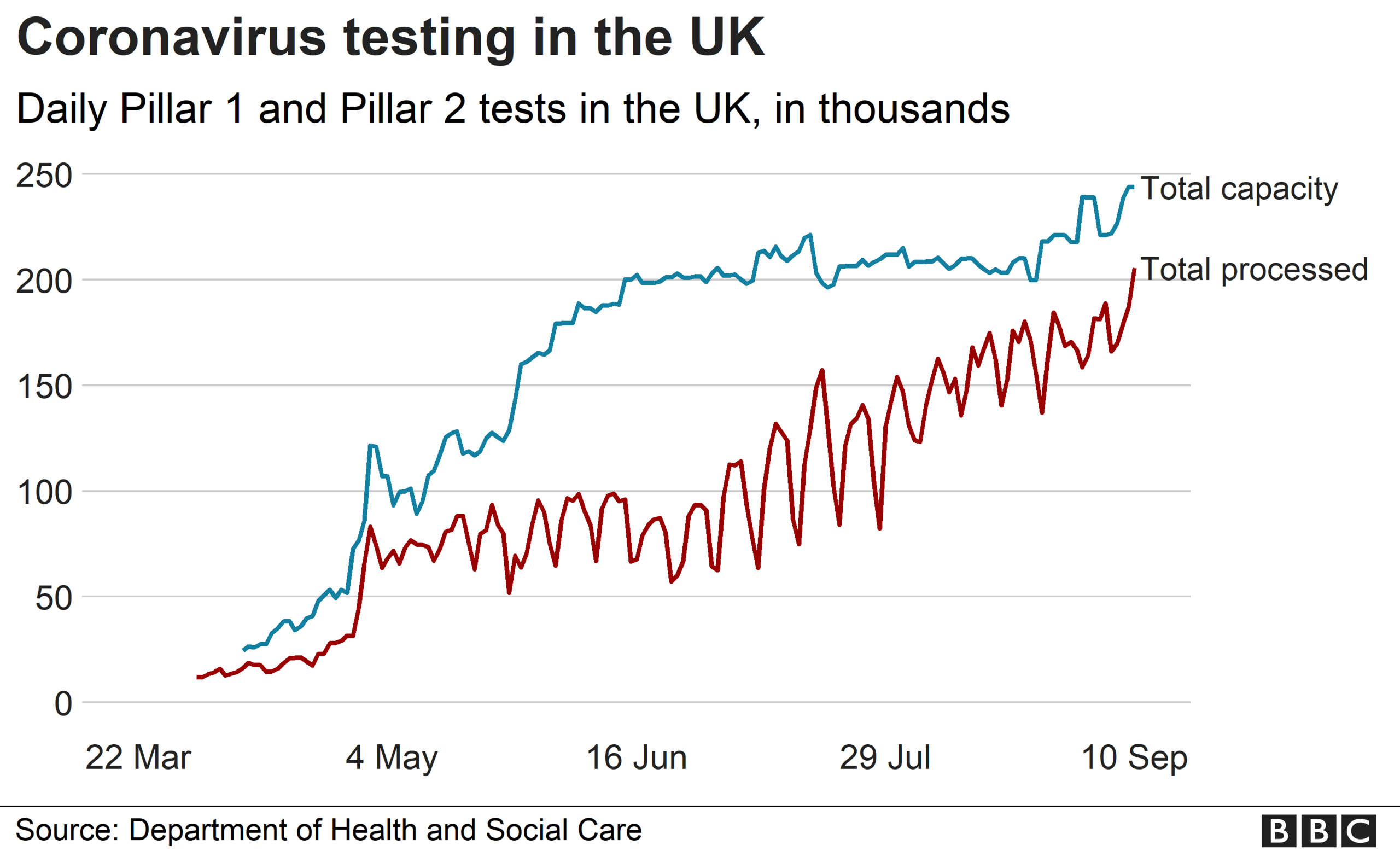
Analysis from Our World In Data, a research team based at the University of Oxford, suggests the UK is now performing more tests than many other countries.
For example, the seven-day average up until 10 September showed the UK had carried out 2.8 tests per 1,000 people. This was ahead of European countries including France (2.1) and Spain and Germany (both 1.8).

TASTE AND SMELL: How are they connected?
RETURN TO FILMING: How has filming EastEnders changed?


Have you had problems getting a coronavirus test? Share your experiences by emailing haveyoursay@bbc.co.uk, external.
Please include a contact number if you are willing to speak to a BBC journalist. You can also get in touch in the following ways:
WhatsApp: +44 7756 165803
Tweet: @BBC_HaveYourSay, external
Please read our terms & conditions and privacy policy
If you are reading this page and can't see the form you will need to visit the mobile version of the BBC website to submit your question or comment or you can email us at HaveYourSay@bbc.co.uk, external. Please include your name, age and location with any submission.
- Published15 September 2020
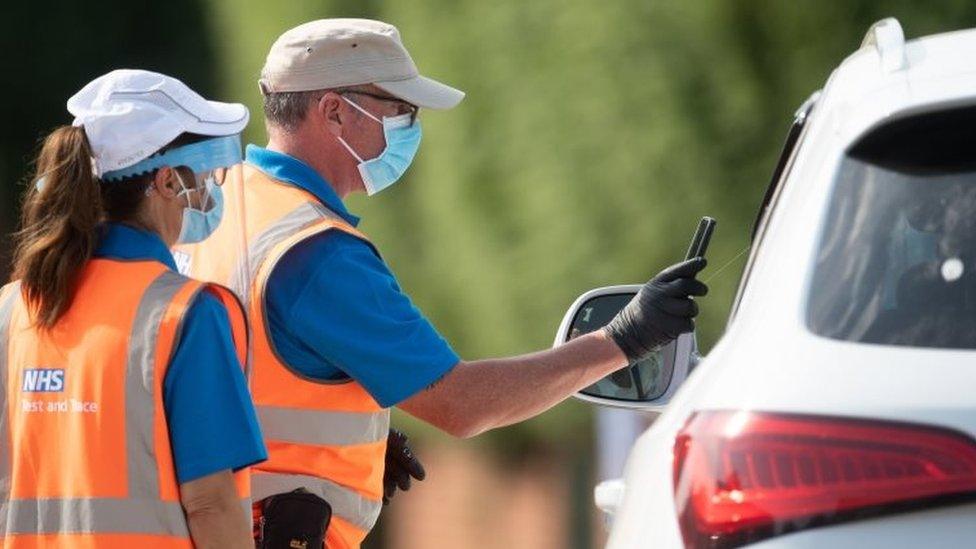
- Published15 September 2020

- Published15 September 2020
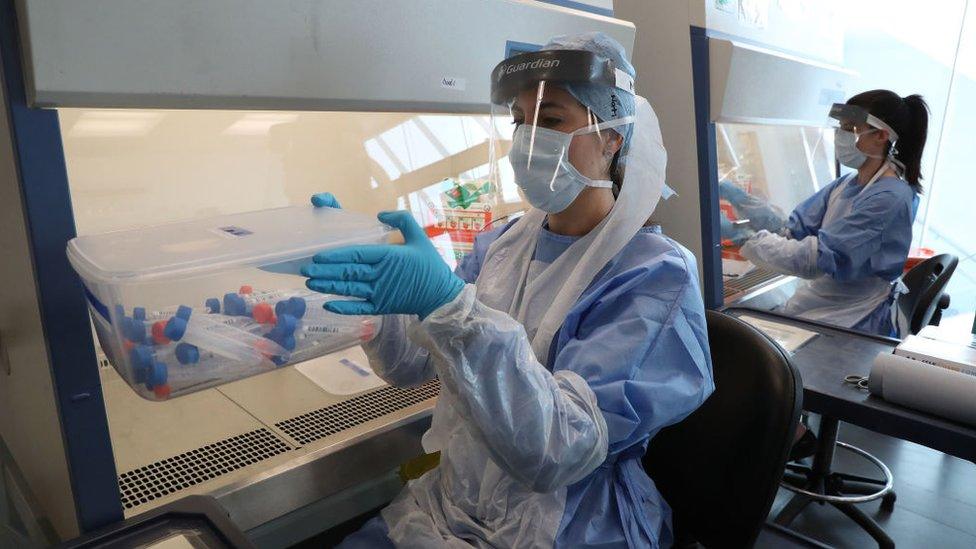
- Published15 September 2020
